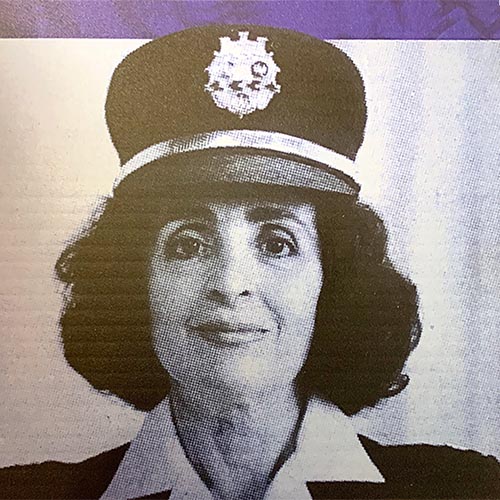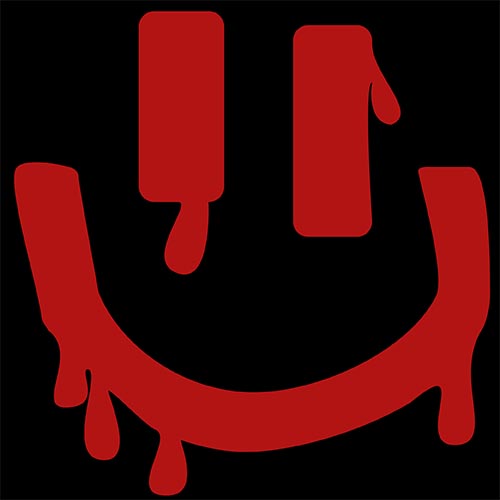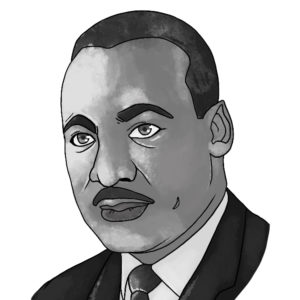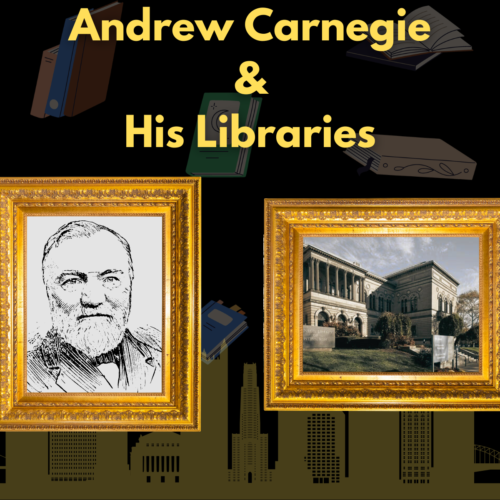
Therese Rocco – A Memoir: Book Review
January 11, 2021
Smiley Face Killers – Fact or Fiction?
January 25, 2021 Dr. King Visits Pittsburgh
Dr. King Visits Pittsburgh
On November 2, 1966, during the Civil Rights Movement, Dr. Martin Luther King Jr. came to Pittsburgh to deliver a speech at The University of Pittsburgh Student Union. His speech concluded with the words, “I still believe in the future. Our goal is freedom, and we’ll get there because the goal of America is freedom. Abused and scorned as we may be, our destiny is bound up with America’s … The heritage of our nation and God are on our side, and with this faith, we will transform the jangling discords of our nation into a symphony of brotherhood.”
Tim Stevens and Dr. King
Tim Stevens, a Pittsburgh native, Civil Rights leader, and the youngest person to become director of the NAACP, was in college at the time of Dr. King’s final speech in Pittsburgh, he and some of his Omicron Chapter Alpha Phi Alpha fraternity brothers gave Dr. King a ride from the airport to his speech at Pitt. Remember that night, Mr. Stevens says, “We went to the airport and picked him up in a car. It wasn’t even a fancy car… He didn’t say, ‘Where’s my Cadillac?’ The one thing I always remember was that he was low-key and not demanding about anything.”
Nobody knew it, but Dr. King would never be able to return to Pittsburgh to deliver another speech. Less than 18 months later, everything changed. Dr. King was assassinated on April 4, 1968; a day after delivering his famous “I’ve Been to the Mountaintop” speech.
Mr. Stevens and some of his fraternity brothers were scheduled to speak at Chatham on that fateful day. Instead of canceling their engagement, they kept it and converted the conversation to be about the death of Dr. King, “Unbeknownst to me there was a professor from the graduate school of Public and International Affairs (GSPIA) at Pitt…I happened to be the one who led the conversation, and he was so impressed with how I facilitated the conversation that he offered me a fellowship to GSPIA at Pitt…indirectly, I owe my graduate school to the death of Dr. Martin Luther King. His death was the birth of my graduate opportunity.”
The Impact of an Assassination
Dr. King’s death had a rippling effect through the country. Riots broke out across the nation, including in Pittsburgh. The Civil Rights movement in Pittsburgh had been peaceful and quiet up until the point Dr. King was murdered. The Hill District, which had been a predominantly African-American community, went up in flames as their anger and hurt manifested itself in a physical form. Riots lasted for days, while the community expressed their pain and rage at what had happened.
Mr. Stevens was raised in the Hill District. His home abutted a business, and if it had caught fire, their home would have also gone up in flames. He had no choice, but to sit in his driveway and defend his home and the business next door, “I sat outside with my rifle that happened to be a toy that shot ping-pong balls. But you couldn’t tell at night that it was a toy . . . It was very sad to see all of these places on fire…and I think we’re just starting to come back from that in the Hill. But for many years, it was a sad atmosphere.”
To fully understand what happened in The Hill District and across many communities across the nation, one needs to look at what the people were feeling, “The sad part was it was just a rage that a lot of people felt. That a man who tried to educate all of us on peace and harmony, and turn the other cheek, trying to create change through silent revolution, was himself destroyed by violence. I think it was just built up frustration in the hearts of black people across the country that led to the physical devastation of our own communities,” said Mr. Stevens.
Dr. Ralph Proctor’s Inspiration
Another leader in the Pittsburgh Civil Rights movement was Dr. Ralph Proctor. He got started in the Civil Rights movement while he was in the military and stationed in the south. He and his fellow troops started to attend sit-ins in Tennessee and Kentucky in 1960. When speaking on his actions, he’s extremely humble, “There’s nothing heroic about it…I just did it…My name isn’t written anywhere . . . when I got arrested I said my name was Anthony Eden.” Anthony Eden was the Prime Minister of the United Kingdom from 1955-57.
After getting out of the service in 1961, Dr. Proctor returned to Pittsburgh and continued the fight for equality. He joined the adult chapter of the NAACP and formed the University of Pittsburgh Chapter of NAACP as a student. In 1963 he became the cohost of NAACP On the Line with Herb Wilkerson. And in 1968, he became the host and producer of Black Horizon and Channel 13.
Through the discussion of their works, Mr. Stevens and Dr. Proctor maintain their humility, stating they never expect to get accolades for what they’ve done to help the community and pick up the pieces after Dr. King was assassinated. Dr. Proctor stated, “They won’t know your name, they won’t know what you did…they won’t know that some of the folks in the movement lost jobs. Some of the folks in the movement nearly lost their lives—Byrd Brown’s boat being blown up in the water.”
“I was certainly personally inspired by Dr. King in what I do…I’m a byproduct of his being present on the planet . . . And what I’ve done since has been inspired by him, and by my local heroes like Alma Fox and Byrd R. Brown,” said Mr. Stevens.
The Legacy Lives On
To this day, Mr. Stevens and Dr. Proctor, along with Alma Fox, and many other heroes of the Civil Rights movement are active and still working to find peace and equity in our world. Mr. Stevens is currently the CEO and chairman of The Black Political Empowerment Project (B-PEP) and is working to ensure that the Pittsburgh African-American community votes in every election. Dr. Proctor is a professor with CCAC and written books on the Civil Rights movement.
On April 11, 1968, just one week after Dr. King’s assassination, the Civil Rights Act of 1968 was signed into law by President Lyndon B. Johnson.
Alma Speed Fox passed away in 2022. Her legacy lives on in the city.
Written by Bianca Labrador
Updated June 4, 2024




